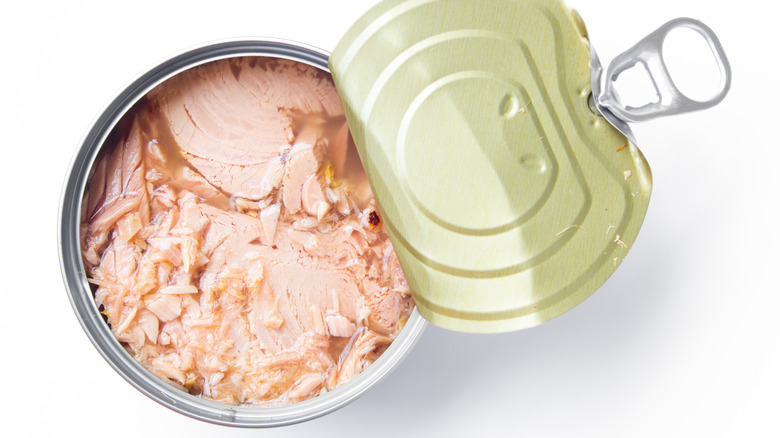The Environmental Reason To Consider Walmart's Canned Tuna
Tuna is a convenient and inexpensive food known for conquering lunchtime hunger through the means of a delicious tuna melt or an equally savory tuna salad. In addition to being fast and cheap, tuna boasts significant health benefits. Tuna is a low-calorie, protein-rich food that's also a good source of Vitamin D and omega-3 fatty acids (via Healthline).
It's also wildly popular across the United States. According to the National Fisheries Institute, Americans eat about 1 billion pounds of pre-packaged tuna every year. America loves its tuna, and there are efforts in place to make Americans pay closer attention to where their tuna comes from.
While you have many options for where to buy tuna, you might not have thought twice about the journey it took from the ocean to your cabinet. Before reaching for another pouch of tasty tuna, you may want to give special consideration to picking it up at your local Walmart.
Saving the ocean through sustainable sourcing
Walmart has been on a mission to provide more sustainably sourced canned tuna. According to a company press release, their goals since 2020 have been to source tuna for Walmart's Great Value brand through either a Marine Stewardship Council or Fishery Improvement Project certification. These organizations require seafood sourcing meets specific guidelines, including the ability to trace the seafood back to a well-managed, healthy fish stock (via MSC). Walmart says its goals include "reducing overfishing, eliminating bycatch and supporting healthier oceans."
Bycatch happens when fish and other sea animals are unintentionally caught, and therefore discarded (via NOAA). Often these are fish that aren't being targeted by the fisherman but end up in the net anyway. Since they're of no value to the fishers, the bycatch is discarded. The NOAA says these discarded animals often suffer injury and death, negatively impacting the marine ecosystem and causing fishers to fish even more.
Walmart wants to take its commitment a step further in the future, saying in the same press release that by 2025 they aim to require the same sustainability certifications for all of the shelf-stable tuna that Walmart sells.
This move from the largest retailer in America (via National Retail Federation) may create ripple effects to make for more sustainably sourced seafood across the board.

